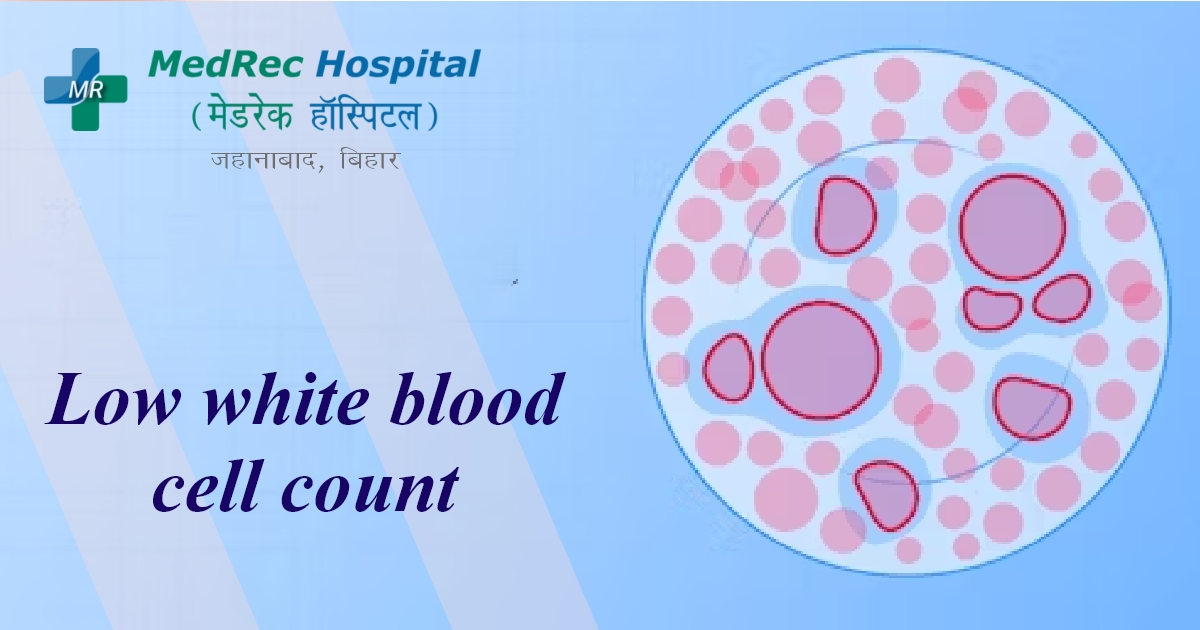
Low White Blood Cell Count Detailed Overview
719
When your white blood cell count is lower than usual, you have leukopenia (low white blood cell count). You have fewer neutrophils than usual, specifically. White blood cells called neutrophils serve as the first line of defense for your immune system. You are more prone to becoming sick if your white blood cell count is low.
Our bodies generate around 100 billion white blood cells every day (leukocytes). Our bodies are protected by leukocytes against invaders like viruses and bacteria that can lead to illnesses.
Leukopenia is characterized by lower-than-normal levels of white blood cells.
Less than 4,000 white blood cells per microliter of blood are considered a low white blood cell count. Age and gender affect normal white blood cell numbers differently. For instance, 5,000 white blood cells are required for men, persons who are born as males, and children.
Blood contains up to 10,000 cells per microliter. 4,500 to 11,000 microliters of blood are within the usual range for females and those who are born with the gender assigned.
There is a link between leukopenia and cancer, but it is not the case. Leukopenia may be induced by cancer therapy.
Your body produces abnormal blood cells that proliferate and multiply if you have leukemia. The healthy cells, including the white blood cells, gradually outweigh the aberrant cells. Leukopenia, or a decrease in white blood cell numbers, results in your body.
White blood cell levels are high and often increase and fall. When the quantity of white blood cells in your blood declines rather than increases, leukopenia occurs. Leukopenia is frequently experienced by people who are undergoing cancer treatment or certain other disorders
Causes
Leukopenia can occur in people who take certain drugs, have certain medical problems, are malnourished, or do not receive enough of certain vitamins. Health issues include:
Multiple myeloma and aplastic anemia are two examples of bone marrow conditions that result in leukopenia.
Autoimmune disorders: When your immune system assaults your body, you develop autoimmune diseases. A couple of instances of autoimmune disorders include lupus and rheumatoid arthritis.
Infections: Leukopenia may be brought on by the HIV virus.
How to check if you have Low White Blood Cell Count?
Complete blood counts are used to diagnose leukopenia by medical professionals (CBCs). If they believe you could have an infection, they might do further testing. These tests might consist of the following:
Urine tests: These examinations may enable medical professionals to identify the infection's root cause.
Chest X-ray: If they suspect you have pneumonia, they could conduct this test.
Symptoms
Leukopenia does not have any symptoms, but it can lead to infections that do. As a result, the following signs might manifest:
- Chills and fever.
- Redness and swelling.
- Mouth ulcers
- Your mouth may have white or red areas.
- Painful throat
- Severe cough or difficulty breathing.
- Unpleasant odor in the urine or painful urination.
- Diarrhea.
- Pus-draining cuts or sores.
- Itching or unusual vaginal discharge.
Signs of infection:
- A high temperature
- Shivers and shivering
- A sore throat that keeps recurring
- Toothaches
- Skin rashes and fatigue are all indications of infection.
Prevention
Leukopenia could be something you cannot prevent. Nevertheless, maintaining excellent general health and avoiding infection are effective methods to lower your risk. Several recommendations are:
- Use a hand sanitiser with an alcohol basis or wash your hands often with soap and water.
- Keep all vaccinations current, especially those for COVID-19 and the flu.
- Avoid being around ill people and crowds where you could come into touch with them.
- Avoid getting scratches, rips, or cuts (including tattoos and piercings), and if you do, treat wounds right away.
- Washing produce and cooking it to the right temperature can help stop the transmission of germs, as will keeping meats away from other foods and cooking them in a clean kitchen.
- Do not divulge sharing dishes, cups, food, or beverages with others.
- Do not let people use your towels, razors, or toothbrushes.
- If you are gardening or doing yard chores, wear gloves.
- Avoid changing a baby's diaper or scooping up pet excrement. (If you must perform these duties, put on gloves and wash your hands afterwards.)
- Avoid hot tubs, rivers, lakes, and ponds.
- Make sure to take the antibiotics that were recommended to you by your doctor to help avoid infections.
Treatments
The underlying reason is treated by medical professionals. For instance, if you have an infection with leukopenia as a result, the illness may be treated with antibiotics or antiviral medications. Other remedies might be:
- These medications function as growth factors to help your bone marrow produce more blood cells. In this situation, growth factor therapy could increase the production of white blood cells.
- Chemotherapy postponement: If you are having chemotherapy for cancer, your doctor may advise holding off on the procedure until your white blood cell count rises.
- If your white blood cell count is low, a blood test might reveal this. The course of your therapy, which frequently includes antibiotics, will depend on what is causing your illness.
Additionally, you could require medical care for the following:
- To increase white blood cell production
- If you have an infection
Complications of Low White Blood Cell Count
Consult a doctor if you get an illness and are aware that you may have a low white blood cell count or if you keep having infections.
For further information please access the following resources:
Emergency : +91 89686 77907
Front Desk : +91 98018 79584
Page last reviewed: Mar 21, 2023
Next review due: Mar 21, 2025







.jpg)
.jpg)
.jpg)
.jpg)
.jpg)
.jpg)